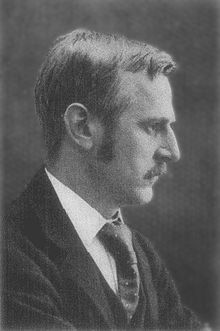Graham Wallas
Graham Wallas (born May 31, 1858 in Monkwearmouth , † August 9 or August 10, 1932 in Portloe , Cornwall ) was a British socialist, social psychologist , political scientist, educationalist, a leader of the Fabian Society and co-founder of the London School of Economics .
Life
Wallas attended Shrewsbury School and Corpus Christi College (Oxford) . He taught at the Highgate School until 1885 when he resigned not to attend the Eucharist . He joined the Fabian Society in April 1886, following friends Sidney Webb and George Bernard Shaw , and served on the board. In 1904 he resigned in a political dispute.
In 1897 he married the socialist author Ada Radford . Wallas worked on reforms in the field of London school education. In 1890 he became a university lecturer and in 1895 this at the London School of Economics, which he co-founded . In 1914 he became the first professor of political science there . He published a biography of Francis Place in 1898 . Through stays in the USA he was able to exert some influence there: 1896–1897, 1910 (Harvard), where he met Walter Lippmann , 1914 (Lowell Lecturer in Boston), 1919 (Yale), 1928 ( Williamstown ). In 1923 he retired from the LSE.
Ideas
In the book Human Nature in Politics (1908) he developed the idea that upbringing and education had no bearing on the political positions of the broad masses. For him, political attitudes are based on emotions and media suggestions. In public discussions, people only perceive what corresponds to their own opinion. Lippmann continued this in 1922 ( Public Opinion ).
In Great Society (1914) Wallas showed that a socio-psychological analysis could explain the problems that the industrial revolution was causing in modern society. He contrasted the role of nature (nature) and nurture (care, environment) and pleaded for their extensive expansion. Lippmann took the title of the book in 1937 for his work on liberalism .
In The Art of Thought (1926) he referred to Hermann von Helmholtz and Henri Poincaré to present a first model of the phases of the creative process with four stages: preparation (or saturation), incubation , enlightenment ( heureka experience) and verification . Mihály Csíkszentmihályi continued the well-known concept.
Fonts
- Property Under Socialism in: Fabian Essays in Socialism (1889).
- The Life of Francis Place, 1771-1854 (1898).
- Human Nature in Politics (1908).
- The Great Society. A Psychological Analysis . (1914). ISBN 978-0217446679
- Our Social Heritage (1921).
- The Art of Thought (1926). ISBN 978-1910146057
literature
- Martin Wiener (1971). Between two worlds: The political thought of Graham Wallas , Oxford: Clarendon Press
Web links
- Literature by and about Graham Wallas in the WorldCat bibliographic database
Single receipts
- ^ Graham Wallas | British political scientist. Retrieved June 26, 2020 (English).
- ^ Graham Wallas - New World Encyclopedia. Retrieved June 26, 2020 .
| personal data | |
|---|---|
| SURNAME | Wallas, Graham |
| BRIEF DESCRIPTION | British social scientist and politician |
| DATE OF BIRTH | May 31, 1858 |
| PLACE OF BIRTH | Monkwearmouth |
| DATE OF DEATH | August 9, 1932 or August 10, 1932 |
| Place of death | Portloe |

